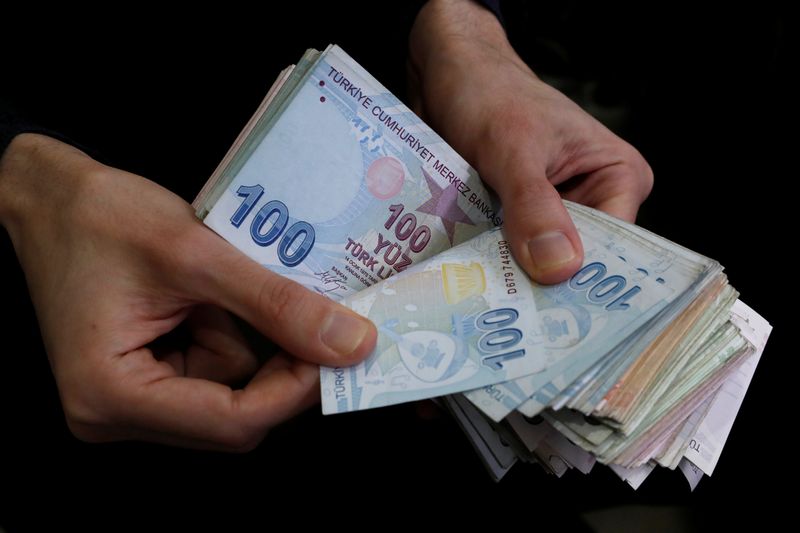LONDON (Reuters) – Turkey’s lira has been driven to record lows on concerns that lower interest rates, depleting FX reserves and a flood of easy credit could pave the way to a second currency crisis in as many years.
The lira’s 20% fall makes its the third-weakest currency in the world this year and adds to a pattern of storms that has become all too regular in recent years.
While these tempests have tended to blow themselves out, usually aided by a blitz of emergency rate hikes, such wild volatility leaves analysts struggling to understand where the lira’s “fair” value really lies, as the charts below show.
1/FAIR VALUE OR FAIR GAME
The International Institute of Finance has just slashed its estimate of lira fair value to 7.50 per dollar from 6.30 in June and 5.50 in April. The calculation factors in the evolution of the country’s current account, which in turn depends on the government’s approach to bank lending and other factors such as the hit to tourism from the coronavirus pandemic.
The government and banks are rolling out unprecedented credit stimulus this year which is supporting growth. But the boost to domestic demand has also raised demand for imports, which is widening the current account deficit to levels last seen in the run-up to the 2018 currency crisis.
“A severe credit crunch in the second half of 2018 put the country into recession, shifting the current account very rapidly from deficit to surplus,” said Robin Brooks, the IIF’s managing director. “We expect a similar dynamic now.”
Graphic: Markets see more Turkish rate hikes ahead https://fingfx.thomsonreuters.com/gfx/editorcharts/gjnpwxqeovw/eikon.png
2/ THE ‘REAL’ PROBLEM
Turkey’s central bank has cut its main interest rate from 24% to 8.25% <TRINT=ECI> since last summer when Murat Uysal was brought in by President Tayyip Erdogan to replace Murat Cetinkaya as its head.
While the coronavirus has triggered a severe economic contraction, the scale of rate cuts has meant the yields savers earn on their deposits and investors earn on government bonds no longer offsets what is still double-digit inflation in Turkey.
That so-called “real” effective interest rate is the lowest in the world barring a few countries, and if investors aren’t buying bonds and savers aren’t depositing, that puts even more pressure on the currency.
Graphic: Turkey has lowest interest rates when inflation factored in https://fingfx.thomsonreuters.com/gfx/mkt/rlgpdnrkmpo/Pasted%20image%201597662056983.png
3/RATE EXPECTATIONS
Money markets have started pricing in higher rates again, as they did in the last lira collapse. The central bank meets on Thursday and if it signals something along those lines – either in terms of a formal rate hike or via back-door channels, as is expected – it should take some pressure off the currency.
Blaise Antin, head of emerging market sovereign research at fund manager TCW, said the “weighted average” cost of funding from the central bank has already risen to 9.3% from 7.3% in mid-July as the bank has tweaked its lending operations.
“That has occurred in just the last 10 to 15 days. That has got many people contemplating whether the central bank will now raise its policy rate,” Antin said.
Graphic: Turkey’s balance of payments https://fingfx.thomsonreuters.com/gfx/mkt/qzjvqwxjwvx/Pasted%20image%201597664502084.png
4/WARNING SIGNS
Commerzbank doesn’t expect a more meaningful policy rethink unless the lira slides to levels nearer 8.50. No blend of banking system tinkering or partial capital-control measures can turn the lira around this time, it says.
Stricter capital controls can perhaps buy some time, but stress still looms. Some analysts say a more fundamental change is needed to a monetary policy approach that more aggressively targets inflation.
The lira could fall much further, as the FX options market has been signalling this month.
5/RESERVES
Turkey’s gross currency reserves have fallen below $47 billion, compared with $81 billion at the start of year. Finance Minister Berat Albayrak has said FX buffers remain more than adequate but his comments have done little to soothe investors’ nerves.
Some analysts say reserves could effectively be used up within months if the current situation persists.
“The reserves that have gone this year, there are not enough left now for that to happen again,” said Kieran Curtis, head of emerging market local currency debt at Aberdeen Standard Investments. “We need some signal that policy has changed,” he said, referring to a need for more orthodox monetary policy and a reduced reliance on credit-fuelled growth.
Graphic: Turkey near bottom of the table of world currencies this year https://fingfx.thomsonreuters.com/gfx/mkt/azgvokqjevd/Pasted%20image%201597697246053.png
6/THE SMALL SHORT
One big difference to 2018 and 2019 is that there are now far fewer international investors in Turkish markets who could cut and run and thereby send the lira skidding further.
Data shows that 2020 has seen at least $30 billion of redemptions by foreigners from equity markets, leaving only around $15 billion still in. Bond holdings have also dropped to lows not seen in years.
At the same time, authorities have clamped down on the foreign exchange market since 2018 by tightly restricting how much local banks can supply to their international counterparts. That has seen the “swap” market shrivel, making it very expensive to borrow the lira to settle a “short” position.
Graphic: Foreign investors have been selling Turkish stocks and bonds https://fingfx.thomsonreuters.com/gfx/mkt/bdwpkeodapm/Pasted%20image%201597664038978.png
7/HOLIDAY SPENDS
The summer holiday season is usually a huge source of foreign currency for Turkey, with millions of tourists spending around $9 billion on hotels and changing cash.
That money typically swings the services part of the country’s current account into a $3 billion surplus, according to Aberdeen Standard’s Curtis.
But the pandemic has savaged tourism: June holidaymaker arrivals were 96% lower than last year and while July and August may have been better, major tour firms estimate pan-European travel is still down by half. “I think this has been a big part of the problem (for the lira),” Curtis said.
Graphic: Turks flock to forex while buffer erode https://graphics.reuters.com/TURKEY-CURRENCY/GOLD/qzjvqwbmbvx/chart.png
(Addition reporting by Rodrigo Campos in New York; Editing by Jonathan Spicer and Hugh Lawson)















